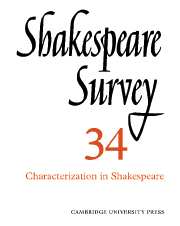Book contents
- Frontmatter
- Shakespeare’s Open Secret
- The Emergence of Character Criticism, 1774–1800
- Society and the Individual in Shakespeare’s Conception of Character
- Realistic Convention and Conventional Realism in Shakespeare
- On Expectation and Surprise: Shakespeare’s Construction of Character
- Shakespeare and the Ventriloquists
- The Rhetoric of Character Construction: Othello
- Characterizing Coriolanus
- The Ironic Reading of The Rape of Lucrece and the Problem of External Evidence
- The Unity of Romeo and Juliet
- No Abuse: The Prince and Falstaff in the Tavern Scenes of Henry IV
- Twelfth Night: The Experience of the Audience
- Plays and Playing in Twelfth Night
- Sceptical Visions: Shakespeare’s Tragedies and Jonson’s Comedies
- Shakespeare in Performance, 1980
- The Year's Contributions to Shakespearian Study 1 Critical Studies
- 2 Shakespeare’s Life, Times and Stage
- 3 Textual Studies
- Index
- Plate Section
On Expectation and Surprise: Shakespeare’s Construction of Character
Published online by Cambridge University Press: 28 March 2007
- Frontmatter
- Shakespeare’s Open Secret
- The Emergence of Character Criticism, 1774–1800
- Society and the Individual in Shakespeare’s Conception of Character
- Realistic Convention and Conventional Realism in Shakespeare
- On Expectation and Surprise: Shakespeare’s Construction of Character
- Shakespeare and the Ventriloquists
- The Rhetoric of Character Construction: Othello
- Characterizing Coriolanus
- The Ironic Reading of The Rape of Lucrece and the Problem of External Evidence
- The Unity of Romeo and Juliet
- No Abuse: The Prince and Falstaff in the Tavern Scenes of Henry IV
- Twelfth Night: The Experience of the Audience
- Plays and Playing in Twelfth Night
- Sceptical Visions: Shakespeare’s Tragedies and Jonson’s Comedies
- Shakespeare in Performance, 1980
- The Year's Contributions to Shakespearian Study 1 Critical Studies
- 2 Shakespeare’s Life, Times and Stage
- 3 Textual Studies
- Index
- Plate Section
Summary
For Grigori Kozintsev, writing the journal about his film, Karol Lir, that turned out so splendidly, Lear surprises us with everything he says and does: ‘From the very first moment his every action is unexpected: it is impossible to guess what he will do next, what tricks he is capable of . . .’ For Stephen Booth in his provocative essay, each sequence in Hamlet should surprise us: ‘From its very first lines, Hamlet frustrates and fulfills expectations simultaneously. . . . The audience’s sensation of being unexpectedly and very slightly out of step is repeated regularly.’
Yet these statements can be reversed, in effect, and the alternative perspectives seem to me valid as well, even though it is difficult to find careful, probing discussion of the ways in which what we expect shapes how we interpret. Unless we anticipate, however wrongly, there can be very little surprise, no frustration, no fulfilment. Most of us 'know' or all-but-know from the first scene of The Merchant of Venice that none of Antonio's ships will return quickly and safely. Later we feel sure that Shylock will not manage to gain his pound of Antonio's flesh. Probably none of us expects Benedick to carry out Beatrice's command: 'Kill Claudio.' And when we read Measure for Measure, do we for long expect Angelo to succeed in killing the other Claudio?
- Type
- Chapter
- Information
- Shakespeare Survey , pp. 39 - 50Publisher: Cambridge University PressPrint publication year: 1982



